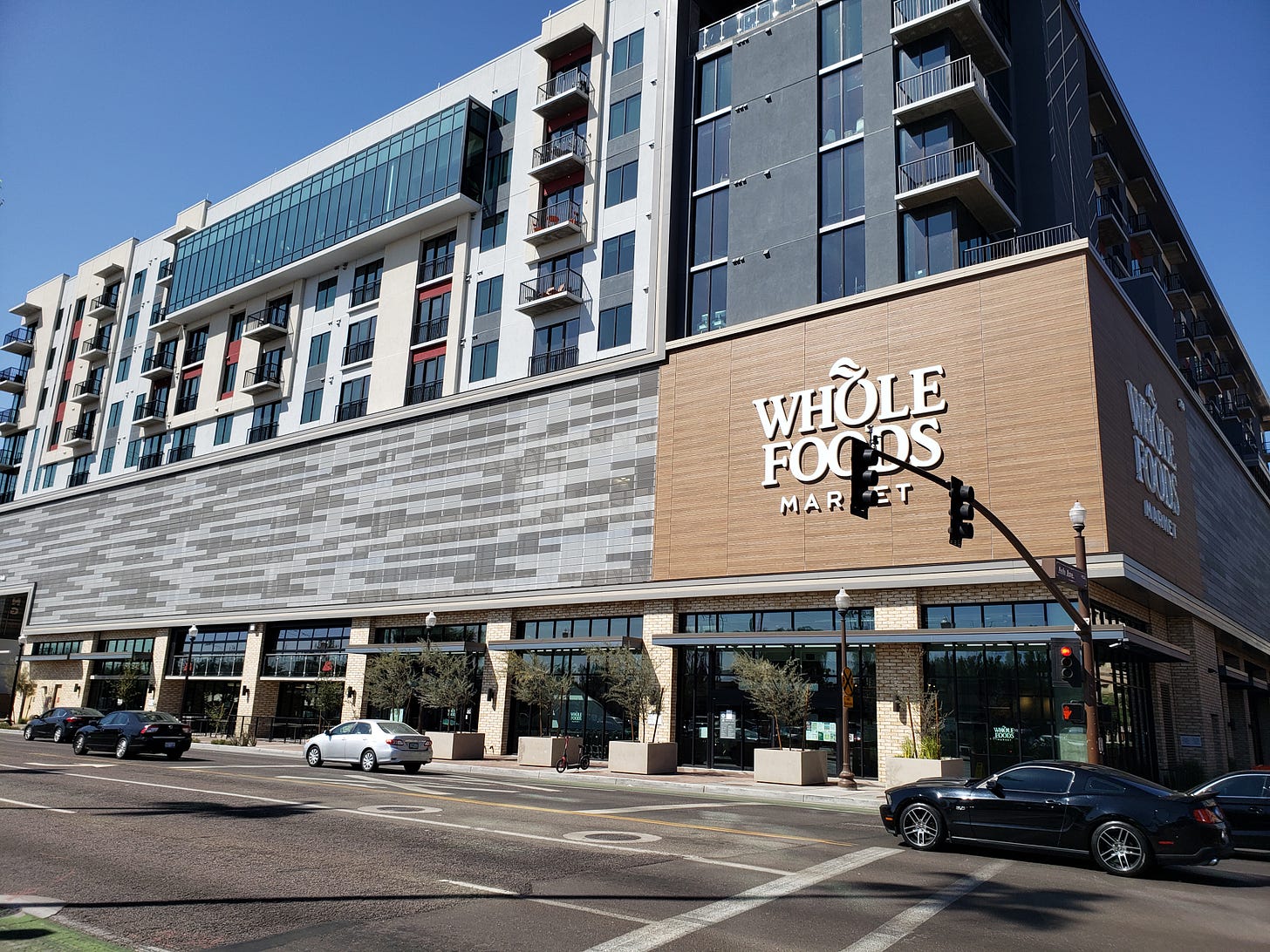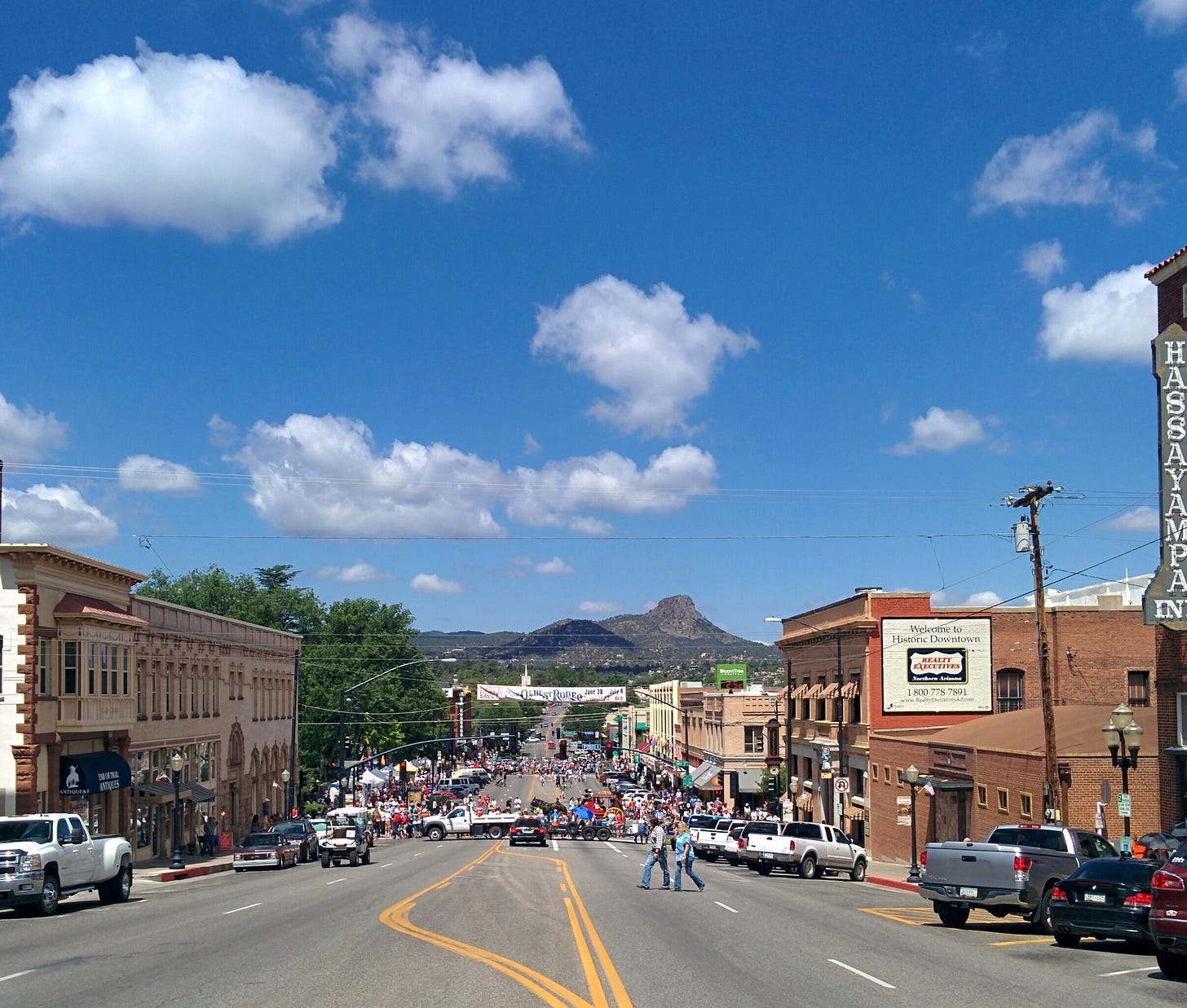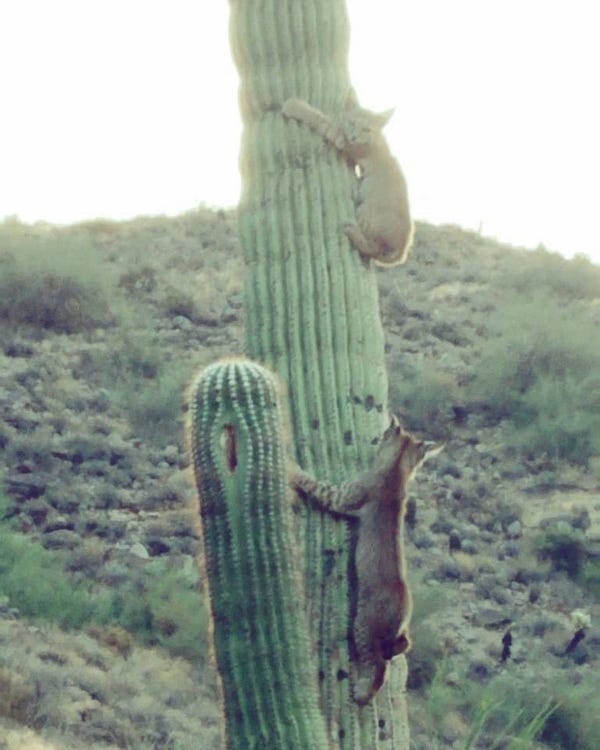If you pass through the downtown areas of Tempe or Phoenix at present, the most striking feature will be the new construction projects in the works. Apartment buildings and office buildings are popping up left and right. Some of these buildings include mixed-use features more common in dense cities — like a retail store operating on the bottom floor of a residential complex.

According to Downtown Phoenix Inc., more than $6 billion (and counting) in private and public investment has gone into the 1.7 square-mile radius of downtown Phoenix since 2005. This money includes revamping of historical spaces, new educational buildings for the ASU campus, and housing complexes.
The same trend is happening in Tempe, which is arguably becoming the second urban core of greater metropolitan Phoenix.
I graduated from the ASU Tempe campus in 2009. If someone had moved away from Tempe that year, and didn’t return until 2020, they would find much of town unrecognizable. The waterfront spaces around Tempe Town Lake are now towering with glass high-rise residential buildings. Old dormitories have been torn down and re-built as boutique student-life compounds. Office buildings are multiplying.
Six months ago, the central city was the place to be.
Then Covid-19 changed everything.
These days, you don’t really want to be packed into dense areas. Many jobs no longer require employees to physically show up for work. Schools are also going remote. We’ve been forced to adapt to social distancing and make it sustainable for the long haul. Even if the virus were to disappear overnight, some of the adjustments would endure.
Will people start migrating towards small towns?
Probably not on a large scale, but even a slight demographic shift may have the side-effect of scrambling our political and cultural dynamics.
One of the most enduring dividing lines in America is the one between city dwellers and country folk. The social situations are different. The economic concerns are different. The physical surroundings are different. Yes, social barriers also exist between blue-collar and white-collar workers in the city, but nothing like the differences in world-views that separate urban and rural America.
Many of the rural towns in Arizona took root as mining boom towns. In the early territorial days, mining discoveries led to the creation of Prescott and Wickenburg. When the mines ran low, or when new sources of gold, silver, or copper were found, the energy flowed to different towns like Globe and Miami, and so it went.
As the state matured, the outposts remained. Meanwhile, sustained population growth was concentrated in the Salt River Valley of Phoenix, where various industries began to flourish, along with agriculture, by mid-century. The universities helped grow larger populations around Tempe, Flagstaff, and Tucson.
If there will be a transition towards small-town living, there’s already an organization giving these towns a glimpse.
Local First Arizona has a program called Weekend Zona that aims to boost in-state tourism to rural towns. Instead of traveling out of state for vacation, the program asks, why not adventure to unseen parts of Arizona?
Visit the website to check out short profiles on towns like Ajo, Bisbee, and Willcox. There’s a lot of natural beauty in the state, and there’s a lot of charm and character in our small towns.
Personally, I’m sold on doing more #RuralAZ adventures — especially in the age of Covid-19, where the idea of plane travel is about as appealing as living in a crowded downtown area.
Prescott in the Spotlight

The U.S. Space Force is a futuristic program aimed at establishing military forces in outer space. This past month, Arizona Senator Kyrsten Sinema was part of a bi-partisan effort to get the Space Force command center placed in none other than Prescott, Arizona.
Prescott is home to an Embry-Riddle campus, a school that seeks to train engineers in, among other things, flight and space science.
This story by Arizona’s Family 3TV has more details about the effort. Here’s a clip referencing Mark Sensmeier from Embry-Riddle’s aerospace engineering program:
He said the state has everything Spacecom could want: good climate, lots of land and space for rocket launches, but also close proximity to a big city like Phoenix for transportation. He said their students are going everywhere from NASA to Boeing to Space X, and believes many would stay in Arizona to work for the U.S. Space Force if they had the chance.
To learn about the fleet of planes, helicopters, and flight simulators at Embry Riddle, click here.
I had planned to spend a weekend in Prescott this past month to take pictures and write about the vibes … but never made it out because we’ve been busy trying to buy a house. More on that in the final thoughts of this newsletter.
Here’s a short bit about Prescott’s origins, from the city website:
Prescott was founded in 1864 as the Territorial Capital of Arizona. Though three of the names originally proposed for Prescott were “Audubon”, “Goodwin City” and “Aztlan”, the name “Prescott” was chosen in honor of William Hickling Prescott, author of The History of the Conquest of Mexico. The Arizona Miner reported that the name was accepted because Prescott was “a good citizen, a true patriot, with industry, perseverance under difficulty, amiability of character and love of country.”
The picture above is courtesy of my friend Logan, whose parents live in Prescott and own an antique shop called Pastime Pleasures. Next time you’re in Prescott for a rodeo or some hiking, check out their shop!
Golden Pineapple Updates

In the first issue of this newsletter, I wrote about the opening of the Golden Pineapple. It was scheduled to open right before the pandemic shut everything down. The Tempe lounge, run by a few creative local bar owners/restaurateurs, seemed like a microcosm of our collective situation: forced to pump the brakes in a time of economic optimism. Could we emerge from the pandemic with a sense of cultural revival?
Back in May, the lights of the Golden Pineapple were turned off. I wasn’t 100% sure if they would actually open, despite their assurances.
It’s now October. The lights are back on and the lounge is fully open (practicing the state-recommended safety protocols).
One night in September, Wendy and I walked over for dinner and cocktails — our first night out since the lockdown.
The drinks were delicious. I had their tequila version of the Old Fashioned. Wendy had some flavorful drink with an orange peel twist.
The food was delicious. We ate pork enchiladas, and chicken with chayote squash and summer corn.
We sat on the patio. It was a cool night.
For a short time it seemed as if nothing worrisome was happening in the world.
Tweet of the Month
I’ve been successfully avoiding most social media, but I have not been successfully avoiding Twitter. In the frenzy of the craziest election cycle in modern history, I can’t help but obsessively check for breaking news.
But sometimes there’s non-political, high-quality content on that depraved website.
Here’s a cool example:




Trick or Treat?
Many parents are undoubtedly wondering about trick-or-treating. Some municipalities in America have expressly prohibited trick-or-treating this Halloween.
My two cents:
Trick-or-treating can be done safely, and it should go on. Kids are walking around outside, usually in the “pods” of their own families, knocking on doors to outstretched hands plopping candy into their buckets or pillow-cases.
If you’re afraid of the hand-off, you can do an underhand candy toss towards the candy receptacle.
If you don’t want any kids on your doorstep, turn off your porch lights and don’t answer the door.
No need to shame others for trying to give their kids a sense of normalcy. No need to antagonize those being more cautious than you think is necessary.
Be responsible. Be reasonable. Be spooky.
Final Thoughts
We’re closing in on a house purchase in Phoenix. It’s been a busy month with paperwork on top of paperwork, but we’re very excited about setting down roots and having a place of our own. Like many millennials, we’ve both been pretty transient in our adult lives — moving states, changing towns, changing jobs, signing leases on apartments. At long last, a sense of permanence. A little stability in a fast-moving world.
Will send some pictures of mountain views next month.
Until then, check out the archives of Cholla Express to get caught up if you missed an issue.
Peace.



